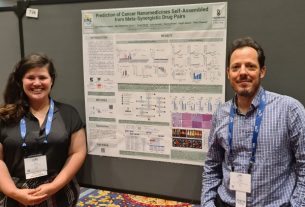The contents of bacteria in the stomach can determine whether a person will develop post-traumatic stress disorder (PTSD) from infancy to late adolescence in humans, according to a new study out of Reichman University in Herzliya.
The microbial profile was found to be one of the factors involved in developing PTSD and it outlines the characteristics linked with resilience, following exposure to trauma. “These findings can serve as a basis for developing microbiome-focused treatments,” the authors wrote. The study integrated the efforts of three laboratories: The Center for Developmental Social Neuroscience at Reichman University; the Koren Lab headed by Prof. Omry Koren at the Azrieli Faculty of Medicine in Safed, which focuses on microbiome research in animal models; and the Applied Mathematics Laboratory, led by Prof. Yoram Louzoun at the Brain Research Center at Bar Ilan University. It was led by Dr. Karen Yirmiya, a postdoctoral fellow at the Center for Developmental Social Neuroscience, in collaboration with Dr. Orna Zagoory-Sharon of Reichman University and Dr. Sondra Turjeman and Oshrit Vignanski of Bar-Ilan University in Ramat Gan.Study is first to successfully link these to factors
This study is the first to successfully link the specific characteristics of the microbiome and the development of verses to the consolidation of resilience. The study involved cross-species validation in germ-free animal models.
Stool samples were collected from participants in their late stages of adolescence (16 to 17 years old), along with samples from their mothers. The study included comparing participants who were exposed to chronic trauma, linked to growing up in Sderot and the Gaza Envelope, to a matched control group of mother-child pairs who were not exposed to war-related trauma. Notably, this study was conducted before October 7 occurred. The findings revealed that a lower diversity of gut bacteria, a factor reflecting the resilience of the microbiome system, distinguished children with PTSD from those who remained resilient, even though both groups were exposed to the same traumatic events throughout their lives. Moreover, children diagnosed with PTSD in early childhood and who displayed lower microbial diversity exhibited a chronic post-traumatic profile. In contrast, toddlers with PTSD from the same region who had a high level of bacterial diversity recovered from PTSD in late childhood. Among the war-exposed group, some children were diagnosed with PTSD, while others who experienced the same traumatic events showed resilience and did not receive a psychiatric diagnosis at any stage of their development.Feldman and her team observed infants born and raised in the town of Sderot and communities of the Gaza Envelope who had been exposed to repeated and unpredictable war-related incidents for two decades, to understand how exposure to continuous trauma throughout development shaped an individual’s brain and biology. Clinicians diagnosed pediatric PTSD at various periods – from early childhood to late adolescence. Feldman explained: “Another new and intriguing finding of the study is that the adolescents diagnosed with PTSD didn’t show microbial synchrony with their mothers, in contrast to the microbial synchrony observed between mothers and children who were not exposed to trauma, or between resilient children and their mothers.” Mother-child microbial synchrony is the natural state, because the infant receives its microbiome from the mother when passing through the birth canal and the mother and since the child lives in the same environment.The lack of microbial synchrony between adolescents with PTSD and their mothers reflects the sense of existential loneliness experienced by PTSD sufferers – an experience that permeates even to the bacteria that they carry in their bodies that should provide them with a layer of health, resilience, and protection, and adjust them to the ecology in which they live.
Another unique aspect of this study in the field of microbiome and mental illness is its validation through animal models. Germ-free mice who were implanted with fecal samples from children with PTSD demonstrated anxious behavior (for example, in the Y-Maze test) in juxtaposition to mice who were implanted with the feces of resilient children who exhibited normative behavior, the team concluded.


